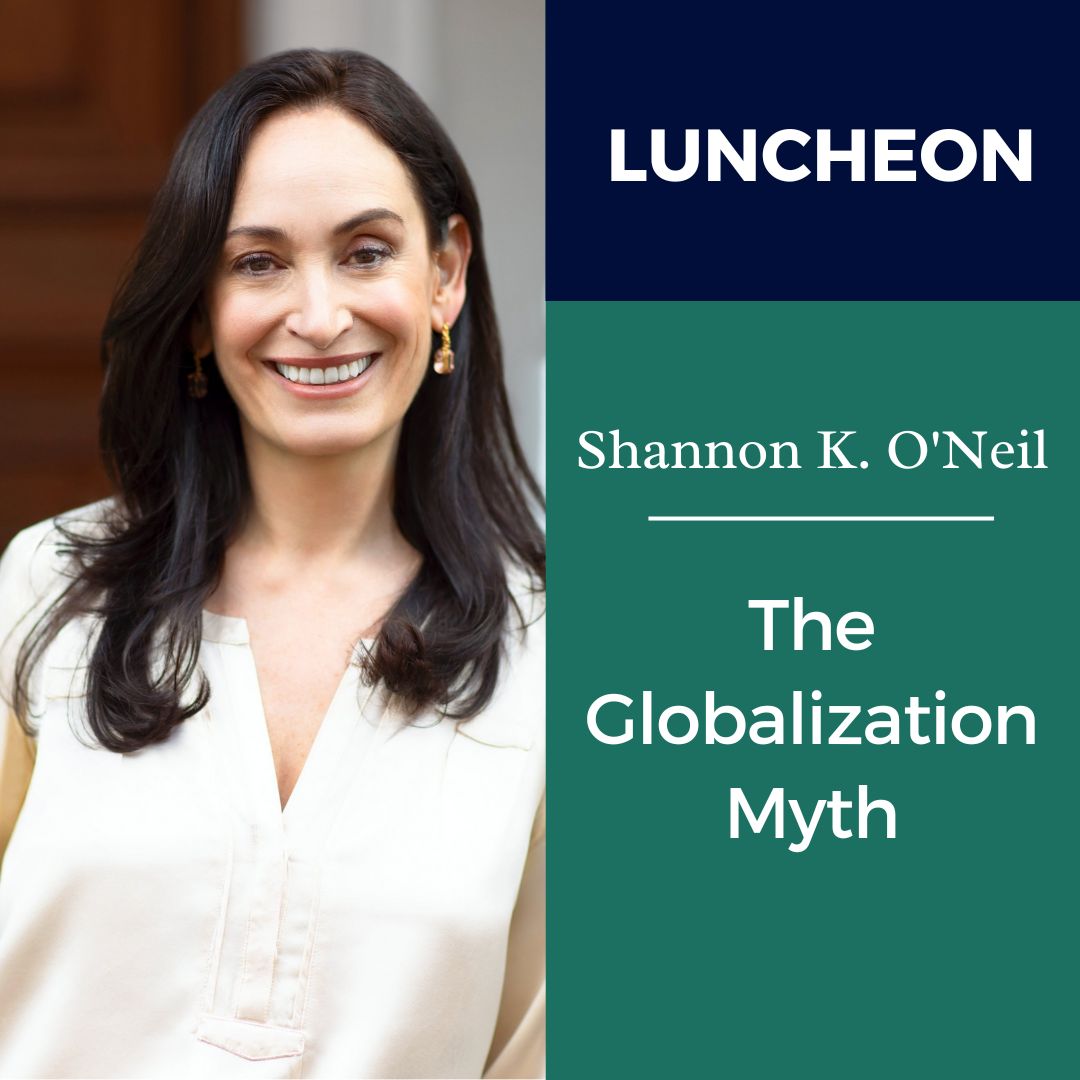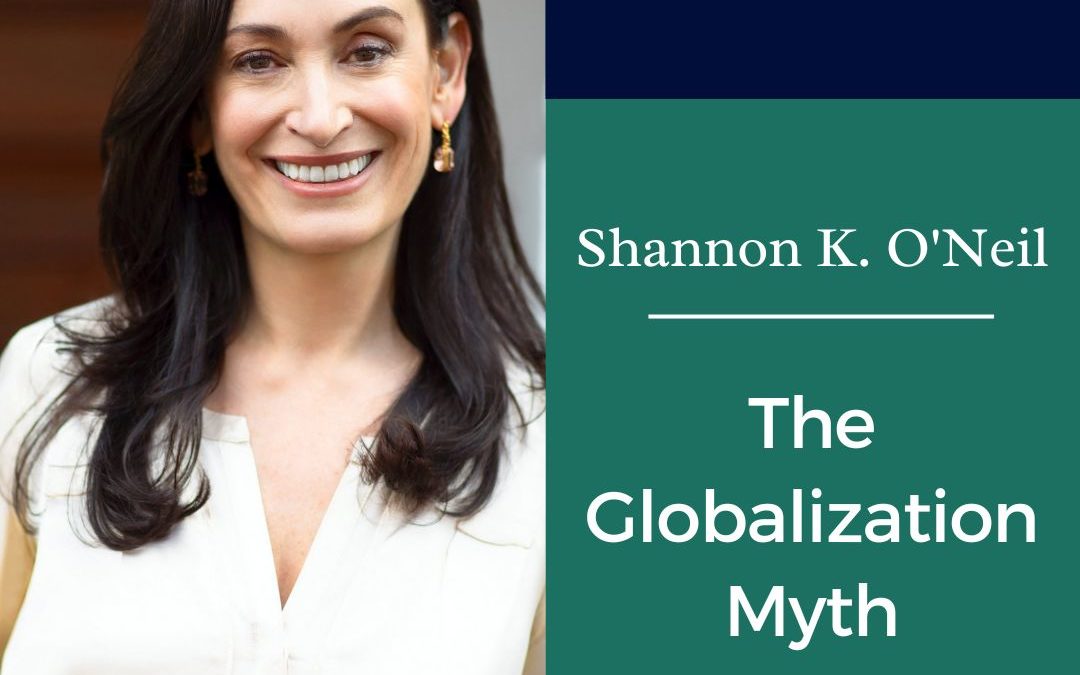
LUNCHEON – The Globalization Myth: Why Regions Matter for the U.S. to Compete with China & Europe
In partnership with

- Registration 11:30 am
- Lunch 12:00 pm
- Program 12:30 – 1:30pm
ABOUT THE EVENT
Shannon K. O’Neil – Vice President & Deputy Director of Latin America studies at the Council on Foreign Relations
Globalization is not the only—or even the real—story of the global economy over the past four decades. In The Globalization Myth: Why Regions Matter, Shannon K. O’Neil shows that the conventional wisdom about globalization is wrong. The world has become more international but not nearly as global as the narrative of economic globalization suggests. As companies, money, ideas, and people went abroad over the last forty years, more often than not they moved and traded regionally rather than globally. They did not go just anywhere; they stayed close to home.
This overlooked reality of regionalization has implications for U.S. policy. Regionalization has enhanced economic competitiveness and prosperity in Asia and Europe. It could do the same for the United States, if only it would embrace its neighbors.
Charting the rise of three major regional supply chain hubs in Asia, Europe, and North America, O’Neil demonstrates how the countries that traded with countries nearer by gained a competitive edge. Regional production chains make products more competitively as they can draw on different skill sets, labor costs, raw materials, financing, and market access. Through lower prices due to economies of scale and higher quality through specialization, regionally made goods become more globally competitive and more likely to edge out similar products made in just one country that tries to go it alone. And this not only boosts sales; by keeping production near at hand in the region, it supports more jobs at home as these factories and assemblers draw on nearer by suppliers. By contrast, for nations without strong commercial ties to their neighbors, workers and consumers are largely left on the ends of global supply chains, relegated to sending out raw materials and bringing in final goods. Unlike in regional hubs, these goods from distant shores compete with, rather than support, local manufacturers, leaving these nations in the economic slow lane.
Despite the rise of a North American manufacturing platform—through the 1993 North American Free Trade Agreement (NAFTA), revised in 2020 as the U.S.-Mexico-Canada Agreement (USMCA)—the United States continues to be less integrated with its neighbors than its Asian or European commercial rivals, as more of its trade still goes to countries outside its region than within it. And while trade benefits the United States as a whole, regional ties in particular help U.S. workers and businesses more than global ones do.
O’Neil shows that while many of the technological, demographic, climate, and policy shifts happening today favor the United States and its economy, regionalization of production and supply chains will still provide commercial advantages. To keep up with and compete against Asia’s expansive reach and Europe’s industrial prowess, U.S. politicians, entrepreneurs, and workers need to recognize that the United States requires deeper integration with its neighbors. Regionalization begets variety, fosters innovation, enhances resilience, and creates a much stronger home base. International trade deals and other policies that recognize this reality would allow the United States to preserve and expand its domain in the global marketplace.
‘The Globalization Myth’ provides a path forward for the United States and other countries looking to get ahead in the global economy. The answer is not isolation, nor is it unfettered globalization. Rather, embracing and deepening regional ties is a way to succeed in an internationally connected and competitive world.
Shannon O’Neil’s acclaimed book ‘The Globalization: Myth Why Regions Matter’ will be available for signing.
ABOUT THE SPEAKER
Shannon K. O’Neil is the vice president, deputy director of studies, and Nelson and David Rockefeller senior fellow for Latin America studies at the Council on Foreign Relations. She is an expert on global trade, supply chains, Mexico, Latin America, and democracy.
Dr. O’Neil is the author of The Globalization Myth: Why Regions Matter (Yale University Press, October 2022), which chronicles the rise of three main global manufacturing and supply chain hubs and what they mean for U.S. economic competitiveness. She also wrote Two Nations Indivisible: Mexico, the United States, and the Road Ahead (Oxford University Press, 2013), which analyzes the political, economic, and social transformations Mexico has undergone over the last three decades and why they matter for the United States. She is a columnist for Bloomberg Opinion, and a frequent guest on national broadcast news and radio programs. Dr. O’Neil has often testified before Congress, and regularly speaks at global academic, business, and policy conferences.
Dr. O’Neil has lived and worked in Mexico and Argentina. She was a Fulbright scholar and a Justice, Welfare, and Economics fellow at Harvard University, and has taught Latin American politics at Columbia University. Before turning to policy, Dr. O’Neil worked in the private sector as an equity analyst at Indosuez Capital and Credit Lyonnais Securities. She holds a BA from Yale University, an MA in international relations from Yale University, and a PhD in government from Harvard University. She is a member of the board of directors of the Tinker Foundation.

